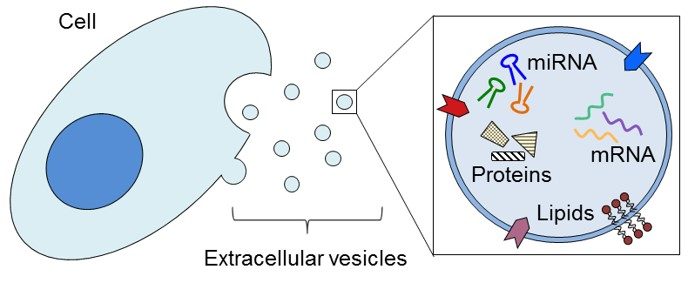Liposome – Extracellular Vesicle Hybrids for Therapeutic RNA Delivery
Prof. Dr. R. M. Schiffelers1), University Medical Center Utrecht/The Netherlands.
People involved
Dr Olivier de Jong (Postdoc sponsored by the PRC) - University Medical Center Utrecht, The Netherlands (o.g.deJong@umcutrecht.nl)
Abstract
RNA-based therapeutics, including siRNA, miRNA, mRNA and CRISPR/Cas9 components, have unprecedented therapeutic potential1) and hold the promise of treating any disease with a genetic component. However, inefficient delivery into diseased cells hinders their clinical progress. Consequently, there is an urgent need for novel, original approaches to overcome the delivery challenges. Recently, an endogenous RNA transport system has emerged, based on the release and uptake of small, phospholipid membrane-enclosed entities called extracellular vesicles (EVs) or exosomes. EVs are membranous nanosized vesicles, released by cells, and play an important role in intercellular communication through intercellular transfer of biological cargo. They are naturally equipped to transfer RNA molecules to other cells in a functional and selective manner, thereby potentially outperforming synthetic RNA nanocarriers. This raises the possibility to use EVs as vehicles for RNA delivery.2)3)4) However, reproducible methods for efficient loading of EVs with therapeutic RNA are lacking.

Origin and cargo of extracellular vesicles (exosomes)
The aim of the project is to radically improve loading of EVs with therapeutic RNA through fusion with liposomes. This includes (i) the development of a novel method to fuse EVs with RNA-loaded liposomes and (ii) the demonstration of the efficacy of liposome-EV hybrids for therapeutic RNA delivery. This work may result in a prototype new generation RNA delivery system based on liposome-EV hybrids.
Benefit for the community
When successful, this work will lead to renewed interest from academia and industry for the phospholipid research area. The RNA therapeutics market is believed to overtake conventional therapies and is expected to become one of the fastest growing therapeutic classes in the pharmaceutical market by 2020. Successful novel treatments based on RNA will drastically lower burden to patients and care takers.
Heart failure is a very lethal disease without a cure for the general patient population and treatment options are limited to pharmacology and heart transplantation. Preventing or slowing down developing heart failure would improve both life expectations and quality of life. For translational research beyond this project, our lab is already evaluating two different types of bioreactors for large scale culture of (stem) cells that will allow reproducible, large scale EV production.
Visit the supervisors lab
RNAi delivery by exosome-mimetic nanovesicles – Implications for targeting c-Myc in cancer
Biomaterials 102, 231-238
| PubMed |
Functional Delivery of Lipid-Conjugated siRNA by Extracellular Vesicles
Mol. Ther. 25, 1580-1587
| PubMed |
Exosomes facilitate therapeutic targeting of oncogenic KRAS in pancreatic cancer
Nature 546, 498
| PubMed |


